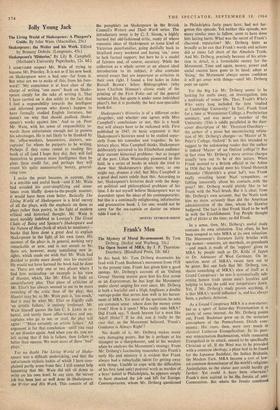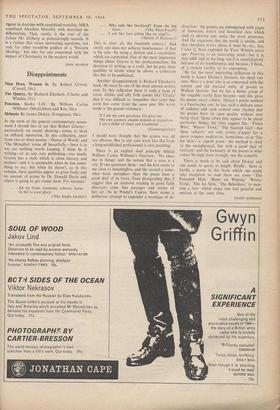Frank's Men
The Mystery of Moral Re-armament. By Tom Driberg. (Seeker and Warburg, 35s.) IN this book Mr. Tom Driberg documents his feud with Frank Buchman's movement from 1928 to the present time. Frank has given him a good innings. Mr. Driberg's account of an 'Oxford Group' Sharing session gave him his first scoop as an Expressman; he has kept the Movement under clever sniping fire ever since. Mr. Driberg is both a Socialist and a High Anglican; a double vantage-point that serves him well in his harass- ment of MRA. Yet most of the questions he asks are common sense: where does the money come from? How is it spent? Who really runs MRA? Did Frank say, 'I thank heaven for a man like Adolf Hitler'? If he did, can it really be the case that, as the Movement believed, 'Frank's Guidance is Always Right'?
No doubt of it, Mr. Driberg makes many very damaging points. But he is perhaps at his strongest as a sharpshooter, and at his weakest when he analyses the Movement's strategy. From Mr. Driberg's fascinating researches into Frank's early life and ministry it is evident that Frank always had a remarkable talent for getting away with things. Unable to cope with the difficulties of his first (and only) pastoral work as warden of a boys' hdstel in Philadelphia, he appears simply to have chucked the job and left for Europe. Contemporaries, whom Mr. Driberg questioned in. Philadelphia forty years later, had not for- gotten this episode. Yet neither this episode, nor many similar ones to follow, seem to have done him lasting harm. What was the secret of Frank's charmed reputation? Mr. Driberg hints as broadly as he can that Frank's words and actions did at times fall short of the Absolute Truth. And Mr. Driberg, precisely because of his atten- tion to detail, is a formidable enemy for the Movement. Time and again, money, power and social success have gone to its head; adept at 'fixing,' the Movement always seems confident it will get away with things—until Mr. Driberg pops up again.
Yet the Big Lie Mr. Driberg seems to be looking for melts away, on investigation, into a multitude of minor fibs. Thus, Franks Who's Who entry long included the item 'studied at Cambridge University.' In fact, Frank lived for a time at Westminster College, a Presbyterian seminary, and was never a member of the University. (This is oddly paralleled in the dust- cover description of Mr. Thornton-Duesbury-- the author of a pious but unconvincing refuta- tion of Mr. Driberg's charges—as 'Master of St. Peter's College, Oxford.' Is not this intended to suggest to the unknowing reader that the author is indeed 'Master of an Oxford college'?) But in fact even Mr. Driberg's more serious charges usually turn out tb be of this nature. When Frank insisted to a British official in the Adlon in 1936 that he should meet his friend Heinrich Himmler ('Heinrich's a great lad'), was Frank really revealing latent Nazi sympathies, or fabling innocently about his contacts .with the great? Mr. Driberg would plainly like to tar Frank with the Nazi brush. But it is clear, from Mr. Driberg's own account, that the Nazis took him no more seriously than did the American administration of the time, whom he likewise badgered. The fact is that Frank liked to be well in with the Establishment. Top People thought well of Hitler at the time; so did Frank.
In a sense, then, Mr. Driberg's useful study contains its own refutation. Too often; he has been tempted to take MRA at its own valuation. The Movement's literature fairly bristles with top names—senators, air marshals, ex-presidents —and much is made of the 'support' given to MRA by people such as Dr. Kishi 'of Japan or Dr. Adenauer of West Germany. On in- spection most of MRA's swans turn out to be geese. But one feels that Mr. Driberg, too, shares something of MRA's view of itself as a Grand Conspiracy : he sees it systematically sub- orning honest trade union men's loyalties and helping to keep the cold war tempdrature down. Yet, if Mr. Driberg's study proves anything, it is that MRA's 'world influence' is, and has always been, a pathetic delusion.
As a Grand Conspiracy MRA is a non-starter; but as a sport of latter-day Protestantism it is surely of some interest. As Mr. Driberg points out, Frank Buchman grew up in the sectarian atmosphere of the Pennsylvania Dutch com- munity. His roots, then, were very much in classical Lutheran Evangelicalism. In its post- war reincarnation Buchmanism, while remaining Evangelical in its attack, ceased to be specifically Christian at all. If the West was to be provided with a common ideology, a place had to be found for the Japanese Buddhist, the Indian Brahmin, the Moslem Turk. MRA became a sort of low- est common denominator of the world's religions. Assimilation to the status quo could hardly go further. Yet could it have been otherwise? Frank's men aspired to be the. Jesuits of anti- Communism. But where the Jesuits combined rigour in doctrine with casuistical morality, MRA combined Absolute Morality with doctrinal in- differentism. That, surely, is the root of the failure Mr. Driberg so painstakingly records. It is a failure that raises interesting questions, not only for other would-be pedlars of a 'Western ideology,' but also for any concerned with the impact of Christianity in the modern world.
JOHN MANDER



































 Previous page
Previous page